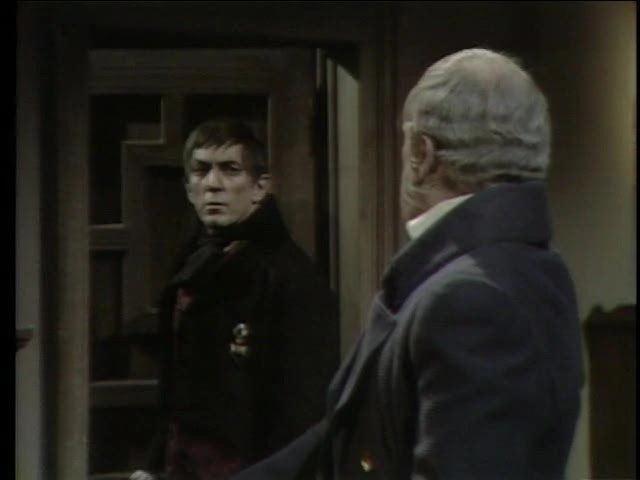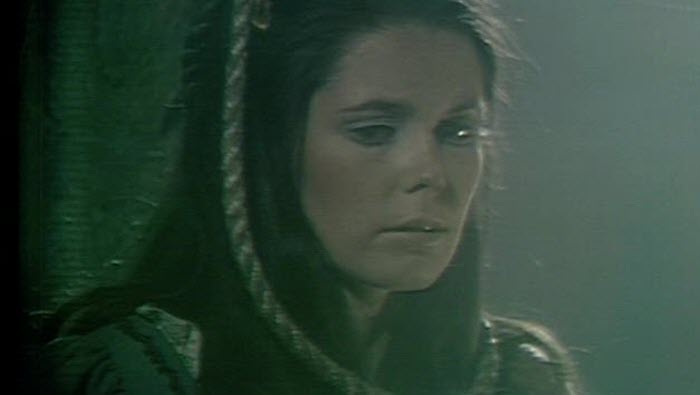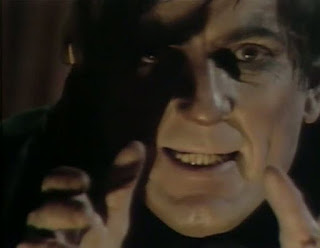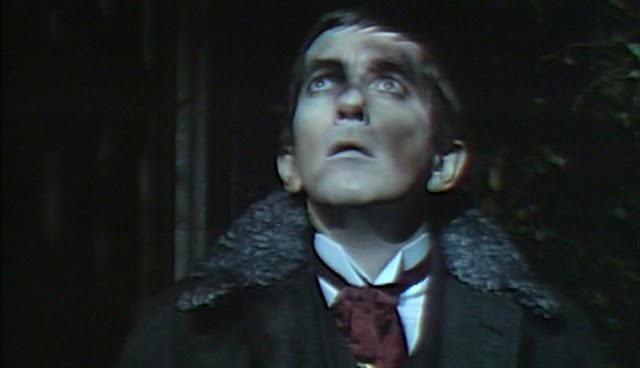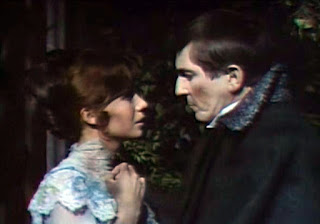Taped on this day in 1968: Episode 460
By PATRICK McCRAY
As Barnabas and Victoria face certain doom, will Joshua, Ben, and destiny unite to propel them into the future? Barnabas Collins: Jonathan Frid. (Repeat; 30 min.)
After the brisk execution of Nathan Forbes, Barnabas instructs Joshua to ensure that this is his son’s last night as a vampire. Joshua vows to do so, but with a curious uncertainty. When it comes time, he cannot pull the trigger, and instead has Ben Stokes chain him in suspended animation. Joshua later honors Barnabas’s request and grants Ben his long overdue freedom. Later, before Victoria is taken to the gallows, Peter Bradford vows that he will find her in time.
We begin with the death of Nathan Forbes. Now, on the other end of one apocalypse, Barnabas is free to unleash the full extent of his wrath. He is no doubt saturated with self-recrimination; he did not allow the dead part of his heart to triumph over the living part, to a literally eternal regret. Perhaps by unleashing his inner evil, he could’ve done more good in the world. It’s a lesson he will carry with him, whether he remembers its impetus or not. Barnabas has only one foe left to destroy: Himself. He asks Joshua to do the honors, but Joshua tellingly procrastinates the attempt until the next day. His father says, enigmatically, that he doesn’t know what lies beyond the grave. He may be speaking existentially. Or he may be forming a plan to send Barnabas to another time. Perhaps to be free of the troubled son. Perhaps with the hope that Barnabas will find an enlightened future.
In this moment, Joshua fixates on rewriting the present. You could argue that it’s for the posterity of the Collins family. And that may very well be somewhat true. But I think there is a more profound truth here. I think Joshua is developing the plan for Barnabas — to be discovered in a future where the burgeoning fidelity to science can conquer the curse of Angélique. Perhaps it’s foolishness. Perhaps it’s vainglorious. These are the sorts of decisions made in the world devoid of women and their anchoring influence. Yes, men are rash. Yes, they are cowardly. Yes they are drunk on a strange, fatalistic optimism. But these are risks that men, left to their own devices, are famous for. It is the blindness of “who dares wins,“ and in times of total desperation, daring is the only choice some have. By reshaping what will become history, Joshua is preparing a safe perch on which his son can land. Now, business concerns are secondary for the patriarch. His wife is gone. His brother is gone. His daughter is gone. All he has is his son. And all he can guarantee is passage to a tomorrow beyond the reach of the shattered present. Although he will later go through the pantomime of attempting to shoot Barnabas in his coffin, I wonder if he had any intention of ever really doing so.
Before they part, Barnabas has just two requests: free Ben Stokes and attempt to liberate Victoria Winters. Joshua responds that he will do both.
Dark Shadows reveals its deepest value, commitment, when the characters can knowingly face death rather than have it sprung upon them. Their’s is world with little control. These are the few moments where control is possible. The characters savor them with gravitas and clarity. It is the same kind of commitment that Barnabas will show Quentin nearly 200 years in the future (and only 45 years in the future) as he assures the execution-bound scientist that he will fulfill all of his final requests. That’s not just Barnabas speaking. That’s Joshua speaking.
Jonathan Frid and Louis Edmonds tackle their final scene with heartbreaking finesse. Crying is not the most powerful thing an actor can do on stage. Rather, it is the attempt not to cry that seizes audiences. In these moments, Frid and Edmonds seize. In a medium of love scenes, there is none more poignant.
The scene will repeat itself later in the episode as Victoria and Peter say farewell. When Peter vows to find her in time’s wilderness, it’s as if he has been subconsciously inspired by Joshua. Just as Barnabas will find some kind of peace in the future unknown, Peter will find Victoria. These are not just wishes or speculations. These are not predictions. These things happen with the tortured confidence of men who seem to have been to the eras they foresee and are reporting back.
Joshua, yes, has a surface level of uncertainty. But he shows commitment nevertheless. And if the viewer should have any doubt that this optimism has feet of clay, Peter’s commitment promises the viewers that Dark Shadows is one universe in which they can have confidence. Yes, Joshua is indulging in history‘s greatest lie. But sometimes it takes a lie to preserve everything that would be lost on the altar of truth. In such cases, life is too precious to squander on the vanities of honor and honesty. They are luxuries reserved for the untested and the fortunate. Joshua is neither.
It’s an episode of haunted goodbyes, but like Ben Stokes contemplating the future, while it is the end of one world, it is the beginning of another. We know, at last, who Barnabas truly is. We know why. We know some of the threats he will face. And we know the heart with which he will face them.
Dark Shadows, as we know it, is finally ready to begin.
It’s the sixth anniversary of the Dark Shadows Daybook. Sharing these moments and insights with you has been the highlight of my life of over a half decade. I want you to know how grateful I am if you are still reading these words and if they have done anything to help deepen your love for this story.
I’ll see you all at Collinwood. Someday.
This episode hit the airwaves March 29, 1968.

